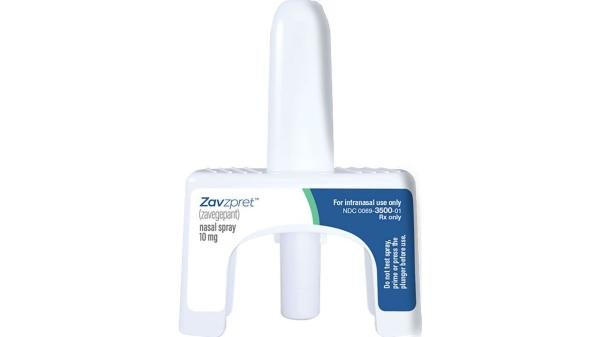Zavegepant Side Effects
Medically reviewed by Drugs.com. Last updated on Apr 27, 2025.
Applies to zavegepant: nasal spray.
Precautions
It is very important that your doctor check your progress at regular visits to see if the medicine is working properly and to decide if you should continue to take it.
This medicine may cause serious allergic reactions, which can be life-threatening and require immediate medical attention. Check with your doctor right away if you have fast heartbeat, skin itching, rash, or redness, swelling of the face, throat, or tongue, or trouble breathing.
Do not take other medicines unless they have been discussed with your doctor. This includes prescription or nonprescription (over-the-counter [OTC]) medicines and herbal or vitamin supplements.
Common side effects of zavegepant
Some side effects of zavegepant may occur that usually do not need medical attention. These side effects may go away during treatment as your body adjusts to the medicine. Also, your health care professional may be able to tell you about ways to prevent or reduce some of these side effects.
Check with your health care professional if any of the following side effects continue or are bothersome or if you have any questions about them:
More common side effects
- change in taste
- loss of sense of taste
Serious side effects of zavegepant
Along with its needed effects, zavegepant may cause some unwanted effects. Although not all of these side effects may occur, if they do occur they may need medical attention.
Check with your doctor immediately if any of the following side effects occur while taking zavegepant:
Incidence not known
- difficulty in breathing or swallowing
- fast heartbeat
- skin itching, rash, or redness
- swelling of the face, throat, or tongue
See also:
For healthcare professionals
Applies to zavegepant: nasal spray.
General adverse events
The most commonly reported adverse reactions were taste disorders, including dysgeusia and ageusia.[Ref]
Gastrointestinal
- Very common (10% or more): Taste disorders (18%)
- Common (1% to 10%): Nausea, vomiting[Ref]
Hypersensitivity
Respiratory
- Common (1% to 10%): Nasal discomfort[Ref]
References
1. (2023) "Product Information. Zavzpret (zavegepant)." Pfizer U.S. Pharmaceuticals Group
More about zavegepant
- Check interactions
- Compare alternatives
- Reviews (14)
- Dosage information
- During pregnancy
- Drug class: CGRP inhibitors
- Breastfeeding
- En español
Patient resources
Other brands
Professional resources
Other brands
Related treatment guides
Further information
Zavegepant side effects can vary depending on the individual. Always consult your healthcare provider to ensure the information displayed on this page applies to your personal circumstances.
Note: Medication side effects may be underreported. If you are experiencing side effects that are not listed, submit a report to the FDA by following this guide.

